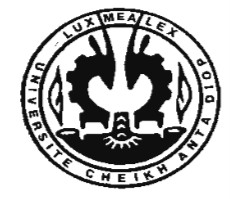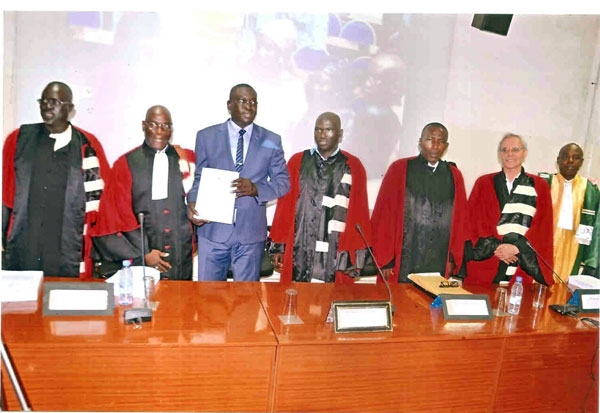UNIVERSITE CHEIKH ANTA DIOP DE DAKAR
(CHEIKH ANTA DIOP UNIVERSITY – DAKAR)

DOCTORAL SCHOOL OF LEGAL, POLITICAL, ECONOMIC SCIENCES AND MANAGEMENT (EDJPEG) FACULTY OF ECONOMICS AND MANAGEMENT (FASEG)
DOCTORATE THESIS Presented by: Papa Samba DIOP To get the Grade of: Doctor of the University Cheik Anta Diop Disciplines: Economics/Management Sciences Foreword
This is a known observation that can be felt everyday: the Sector of Water and Sanitation moves at a slower pace than the weight of hopes placed in it. Like a burden on the ankle, the sector is stalling, showing a big delay on the evolution of demand and the needs expressed by new land use policies, population growth, improving standard of living amongst others. Disparities give our achievements map the aspects of a leopard skin: here, the good points give full lines; there, emptiness enhances the contrast.
The coverage rate is very small in some areas, in proportion to the small amount of funds injected into the expansion, maintenance and modernization of various drinking water and sanitation networks. Many causes account for these woes. Indeed, many determinants are emerging. They range from the increasing scarcity of water resources to often inadequate techniques and technologies through the non-capitalization of good practices.
These technical and managerial failures inevitably imply relatively low performance. There is a field that research should explore in order to fertilize the reflection on the sector and serve as a beacon to the formulation and implementation of effective and proactive policies on future challenges. The living conditions of new generations call on us because it's today that the battles of the future are prepared and won. In this respect, Water and Sanitation are a relevant topic, which issues we have decided to understand. Knowing that these overall performances require the consideration of several indicators, and to make sense, the contribution hereafter, has for guideline the suggestion of solutions. They won’t be working if they do not meet the requirements of the context, at the economic, ecological, managerial and policy levels.
This approach is based on this wonderful instrument of sharing experiences, which is the increasingly practiced benchmarking within the African Water Association (AfWA) and elsewhere in the world. However, this practice is to be framed and limited to ethics, timeliness, credibility, public utility threshold and the nature of the activity. This warning is important because the practiced benchmarking type is sometimes sidestepped by a lack of hierarchy between water and/or sanitation utilities (WSU). And this is far from being a detail since the bases of performance rating calculation are not the same.
The example of Kenya was a decisive contribution to the construction of a theoretical model of the new approach for calculating performance. In fact the basic data used come from WASREB, whose system should make a snowball and inspire other African countries. Let's be clear: the expertise of the regulatory body is without any reproach. WASREB has authority in its field of competence. Let’s also be realistic, it is difficult to compare the performance of utilities specialized in the production and operation of drinking water with utilities that only deal with sanitation and finally, the institutions that are present at the same time, in sanitation and drinking water.
These three business profiles call for a categorization differentiation in order to have reliable results reflecting the specific activities of the various organizations. That is where our challenge lies. Moreover, we have decided to build mathematical models through linear regression to get to calculate and predict the overall performance. This method aims to remove this contextualization barrier in comparing the performance of Water and Sanitation Utilities (WSU). Better, this mathematical perspective can provide answers on the sector organizations likely to ensure the best performance for the WSU.
To be more pragmatic, there is no more need to lengthen speeches and theories that are already developed around the calculation of performance by offering other reliable shortcuts; it’s from this perspective that we have shown that this performance largely depends on the means at the disposal of the WSU. The turnover symbolizes it through a model that is also based on the coverage rate. Turnovers are correlated to revenues, which themselves depend on service costs. Therefore, we can see a conflict between performance increase aligning with revenue increase and an obligation to reduce service costs in order to promote a greater access to water and sanitation. The solution inherently requires a revision of billing methods which tend to make large consumers pay more instead of others.
This option is not without consequences, for it implies service cost competition with mineral water costs; leading to several attitude changes from the users of the large consumer segment who migrate to purchasing this product as a substitute, thus causing a loss to WSU. To this disturbance we can add an upheaval in the water industry with production from local industries and a greater import. Anything that has social impacts, including the mobilization of resources from household to pay for water; an income effect appears at this point.

 English
English  Français
Français 
